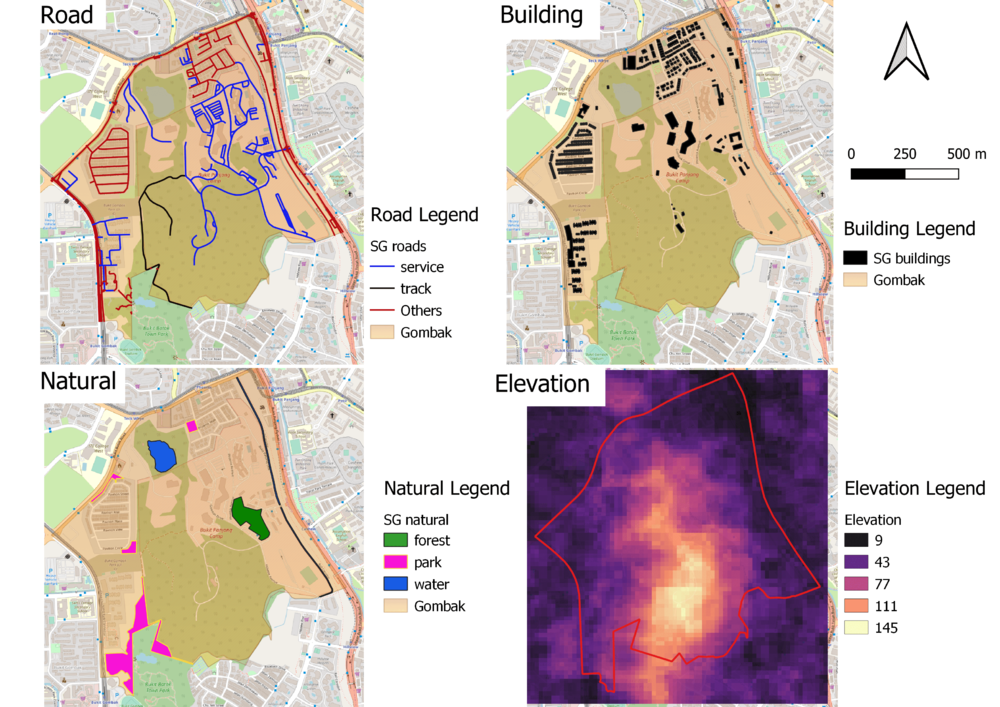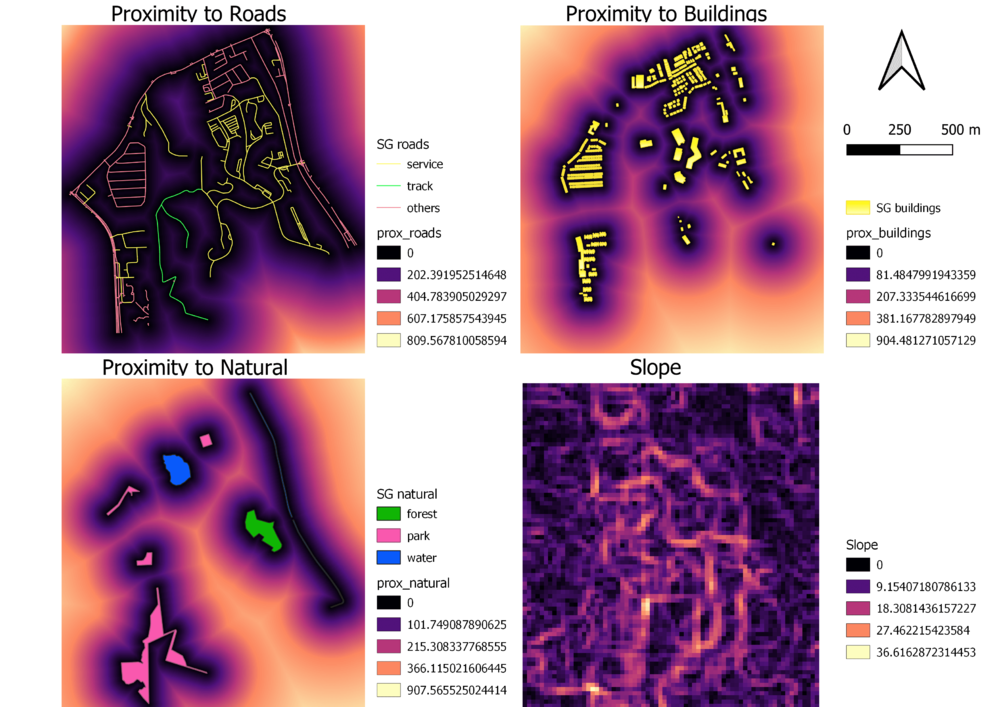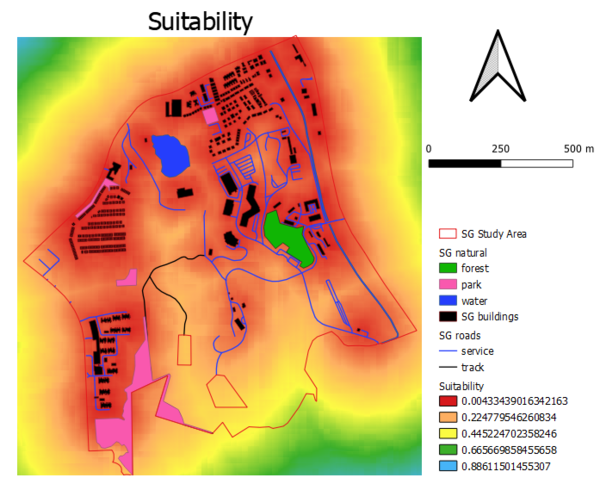Difference between revisions of "SMT201 AY2019-20T1 EX2 Zang Yu"
Yu.zang.2016 (talk | contribs) |
Yu.zang.2016 (talk | contribs) |
||
| (30 intermediate revisions by the same user not shown) | |||
| Line 4: | Line 4: | ||
====Roads (Accessibility Factor) ==== | ====Roads (Accessibility Factor) ==== | ||
| − | The roads are divided into service roads, tracks, and other type of roads. There are 2 tracks and 199 service roads in the data-set. From the map, we can see that the 2 tracks are located around the southern region of Gombak. Majority of the service roads are spread around the north-east region and minority of it are spread around west region. Therefore, eastern region of Gombak is the most accessible as it is closest to existing local roads. | + | The roads are divided into service roads, tracks, and other type of roads. There are 2 tracks and 199 service roads in the data-set. From the map, we can see that the 2 tracks are located around the southern region of Gombak. Majority of the service roads are spread around the north-east region and minority of it are spread around west region. Therefore, the eastern region of Gombak is the most accessible as it is closest to existing local roads. |
====Buildings (Health Risk Factor) ==== | ====Buildings (Health Risk Factor) ==== | ||
| − | There are a lot of missing data in the "type" column of the data-set. Hence it is not meaningful to classify the buildings based on the building type. Most of the buildings are located around the boundary and very few of them located in the central. By looking at the map, it seems | + | There are a lot of missing data in the "type" column of the data-set. Hence it is not meaningful to classify the buildings based on the building type. Most of the buildings are located around the boundary and very few of them located in the central. By looking at the map, it seems more suitable to build the quarantine center nearer to the southern region away from population. |
====Natural Features (Natural Conservation Factor)==== | ====Natural Features (Natural Conservation Factor)==== | ||
| Line 13: | Line 13: | ||
====Elevation (Economic Factor) ==== | ====Elevation (Economic Factor) ==== | ||
| − | The areas with lighter colors are steeper and most of it are located at the central region. The areas with darker | + | The areas with lighter colors are steeper and most of it are located at the central region. The areas with darker colors are flatter and more suitable for building the quarantine center. |
== Proximity analysis == | == Proximity analysis == | ||
| − | [[File:Proximity Zangyu-min.png|1000px|center]] | + | <br> [[File:Proximity Zangyu-min.png|1000px|center]]<br> |
| + | |||
| + | ====Proximity to Roads (Accessibility Factor) ==== | ||
| + | Darker color areas are regions that are nearer to the road. The selected site should be close to existing local roads. Therefore, the darker areas around the service roads or tracks are more suitable for building the quarantine center. | ||
| + | |||
| + | ====Proximity to Buildings (Health Risk Factor) ==== | ||
| + | The area nearer to the building is darker as compared to the area further away which is lighter. Since the selected site should be away from the population, the land lots with lighter color are more suitable for building the quarantine center. | ||
| + | |||
| + | ====Proximity to Natural Features (Natural Conservation Factor)==== | ||
| + | The land lots with lighter color are further away from the natural features. The selected site should be away from forested areas, the park and water body. Therefore, land lots with lighter color are more suitable for building the quarantine center. | ||
| + | |||
| + | ====Proximity to Elevation (Economic Factor) ==== | ||
| + | The land lots with darker color have flatter surface area. The maximum steepness is around 36.6 degrees. We should avoid steep slopes so darker areas are more suitable. | ||
== Criterion scores == | == Criterion scores == | ||
| + | <br> [[File:Criterion scores Zangyu.png|1000px|center]]<br> | ||
| + | |||
| + | I have used Min-Max criteria standardization techniques to standardize the score. | ||
| + | |||
| + | ====Criterion scores of Roads (Accessibility Factor) ==== | ||
| + | Formula = (Proximity to roads- Min(Proximity to roads) / (Max(Proximity to roads)-Min(Proximity to roads)) <br> | ||
| − | + | The criterion score for road is between 0 and 1. The area that are nearer to the roads have a lower standardized score. The area that are further away from the roads have a higher standardized score. Therefore, area with lower road criterion score are more suitable for build the quarantine center. | |
| + | |||
| + | ====Criterion scores of Buildings (Health Risk Factor) ==== | ||
| + | Formula = (Proximity to building - Min(Proximity to building) / (Max(Proximity to building)-Min(Proximity to building)) <br> | ||
| + | |||
| + | The criterion score for building is between 0 and 1. The area that are nearer to the buildings have a lower standardized score. The area that are further away from the buildings have a higher standardized score. Therefore, area with higher building criterion score are more suitable for build the quarantine center. | ||
| + | |||
| + | ====Criterion scores of Natural Features (Natural Conservation Factor)==== | ||
| + | Formula = (Proximity to natural features- Min(Proximity to natural features) / (Max(Proximity to natural features)-Min(Proximity to natural features)) <br> | ||
| + | |||
| + | The criterion score for natural features is between 0 and 1. The area that are nearer to the natural features have a lower standardized score. The area that are further away from the natural features have a higher standardized score. Therefore, area with higher score are more suitable for build the quarantine center. | ||
| + | |||
| + | ====Criterion scores of Elevation (Economic Factor) ==== | ||
| + | Formula = (Proximity to slope - Min(Proximity to slope ) / (Max(Proximity to slope )-Min(Proximity to slope )) <br> | ||
| + | |||
| + | The criterion score for slope is between 0 and 1. The area that are steeper have a higher standardized score. The area that are flatter have a lower standardized score. Therefore, area with lower slope criterion score are more suitable for build the quarantine center. | ||
== Analytical Hierarchical Process Input Matrix and Result Report == | == Analytical Hierarchical Process Input Matrix and Result Report == | ||
| − | [[File:AHP Zangyu 1.png| | + | <br> [[File:AHP Zangyu 1.png|600px|center]]<br> |
| + | [[File:AHP Zangyu 2.png|600px|center]]<br> | ||
| + | |||
| + | I have use pair-wise comparison method of AHP to show the relative importance of each factors. I have ranked the health risk factor as highest priority as the main the purpose of building "Communicable Disease Quarantine Center" was to avoid disease spreading to non-affected population. The second most important factor is accessibility as the selected site must be close enough to existing local roads in order to be able to transport the building materials that are needed during the construction. The next factor is natural conservation, this is to make sure the disease will not contaminate these nature features. The least important priority is economic factor because the other 3 factors are more important than the amount of development cost. | ||
== Suitability Land Lot(s) == | == Suitability Land Lot(s) == | ||
| + | [[File:Suitability Zangyu.png|600px|center]] | ||
| + | |||
| + | Formula = ("Standardised buildings@1"*0.596)+("Standardised_natural@1"*0.204)+("Standardised_roads@1"*0.141)+("Standarised_slope@1"*0.059) | ||
| + | |||
| + | I have used the formula shown above to calculate the suitability of the land to build the Communicable Disease Quarantine Center. The higher the suitability value, the more suitable it is. There are two possible land lots. Both are shown using red outlines. The first has an area of approximately 10450.64m2 and is connected with the track road. The second has an area of approximately 21290.3m2 and is connected to a service road. The second land lot is better because it has a slightly higher suitability value and is located further away from the park than the first land lot. | ||
Latest revision as of 22:34, 10 November 2019
Contents
Study Area
Roads (Accessibility Factor)
The roads are divided into service roads, tracks, and other type of roads. There are 2 tracks and 199 service roads in the data-set. From the map, we can see that the 2 tracks are located around the southern region of Gombak. Majority of the service roads are spread around the north-east region and minority of it are spread around west region. Therefore, the eastern region of Gombak is the most accessible as it is closest to existing local roads.
Buildings (Health Risk Factor)
There are a lot of missing data in the "type" column of the data-set. Hence it is not meaningful to classify the buildings based on the building type. Most of the buildings are located around the boundary and very few of them located in the central. By looking at the map, it seems more suitable to build the quarantine center nearer to the southern region away from population.
Natural Features (Natural Conservation Factor)
Most of the natural features are located around the boundary of Gombak. The forest is located in the east region. The water bodies are located in both east and north regions. The parks are located in west and south-west regions of Gombak. Therefore, the central and south-east are more suitable to build the quarantine centre.
Elevation (Economic Factor)
The areas with lighter colors are steeper and most of it are located at the central region. The areas with darker colors are flatter and more suitable for building the quarantine center.
Proximity analysis
Proximity to Roads (Accessibility Factor)
Darker color areas are regions that are nearer to the road. The selected site should be close to existing local roads. Therefore, the darker areas around the service roads or tracks are more suitable for building the quarantine center.
Proximity to Buildings (Health Risk Factor)
The area nearer to the building is darker as compared to the area further away which is lighter. Since the selected site should be away from the population, the land lots with lighter color are more suitable for building the quarantine center.
Proximity to Natural Features (Natural Conservation Factor)
The land lots with lighter color are further away from the natural features. The selected site should be away from forested areas, the park and water body. Therefore, land lots with lighter color are more suitable for building the quarantine center.
Proximity to Elevation (Economic Factor)
The land lots with darker color have flatter surface area. The maximum steepness is around 36.6 degrees. We should avoid steep slopes so darker areas are more suitable.
Criterion scores
I have used Min-Max criteria standardization techniques to standardize the score.
Criterion scores of Roads (Accessibility Factor)
Formula = (Proximity to roads- Min(Proximity to roads) / (Max(Proximity to roads)-Min(Proximity to roads))
The criterion score for road is between 0 and 1. The area that are nearer to the roads have a lower standardized score. The area that are further away from the roads have a higher standardized score. Therefore, area with lower road criterion score are more suitable for build the quarantine center.
Criterion scores of Buildings (Health Risk Factor)
Formula = (Proximity to building - Min(Proximity to building) / (Max(Proximity to building)-Min(Proximity to building))
The criterion score for building is between 0 and 1. The area that are nearer to the buildings have a lower standardized score. The area that are further away from the buildings have a higher standardized score. Therefore, area with higher building criterion score are more suitable for build the quarantine center.
Criterion scores of Natural Features (Natural Conservation Factor)
Formula = (Proximity to natural features- Min(Proximity to natural features) / (Max(Proximity to natural features)-Min(Proximity to natural features))
The criterion score for natural features is between 0 and 1. The area that are nearer to the natural features have a lower standardized score. The area that are further away from the natural features have a higher standardized score. Therefore, area with higher score are more suitable for build the quarantine center.
Criterion scores of Elevation (Economic Factor)
Formula = (Proximity to slope - Min(Proximity to slope ) / (Max(Proximity to slope )-Min(Proximity to slope ))
The criterion score for slope is between 0 and 1. The area that are steeper have a higher standardized score. The area that are flatter have a lower standardized score. Therefore, area with lower slope criterion score are more suitable for build the quarantine center.
Analytical Hierarchical Process Input Matrix and Result Report
I have use pair-wise comparison method of AHP to show the relative importance of each factors. I have ranked the health risk factor as highest priority as the main the purpose of building "Communicable Disease Quarantine Center" was to avoid disease spreading to non-affected population. The second most important factor is accessibility as the selected site must be close enough to existing local roads in order to be able to transport the building materials that are needed during the construction. The next factor is natural conservation, this is to make sure the disease will not contaminate these nature features. The least important priority is economic factor because the other 3 factors are more important than the amount of development cost.
Suitability Land Lot(s)
Formula = ("Standardised buildings@1"*0.596)+("Standardised_natural@1"*0.204)+("Standardised_roads@1"*0.141)+("Standarised_slope@1"*0.059)
I have used the formula shown above to calculate the suitability of the land to build the Communicable Disease Quarantine Center. The higher the suitability value, the more suitable it is. There are two possible land lots. Both are shown using red outlines. The first has an area of approximately 10450.64m2 and is connected with the track road. The second has an area of approximately 21290.3m2 and is connected to a service road. The second land lot is better because it has a slightly higher suitability value and is located further away from the park than the first land lot.





